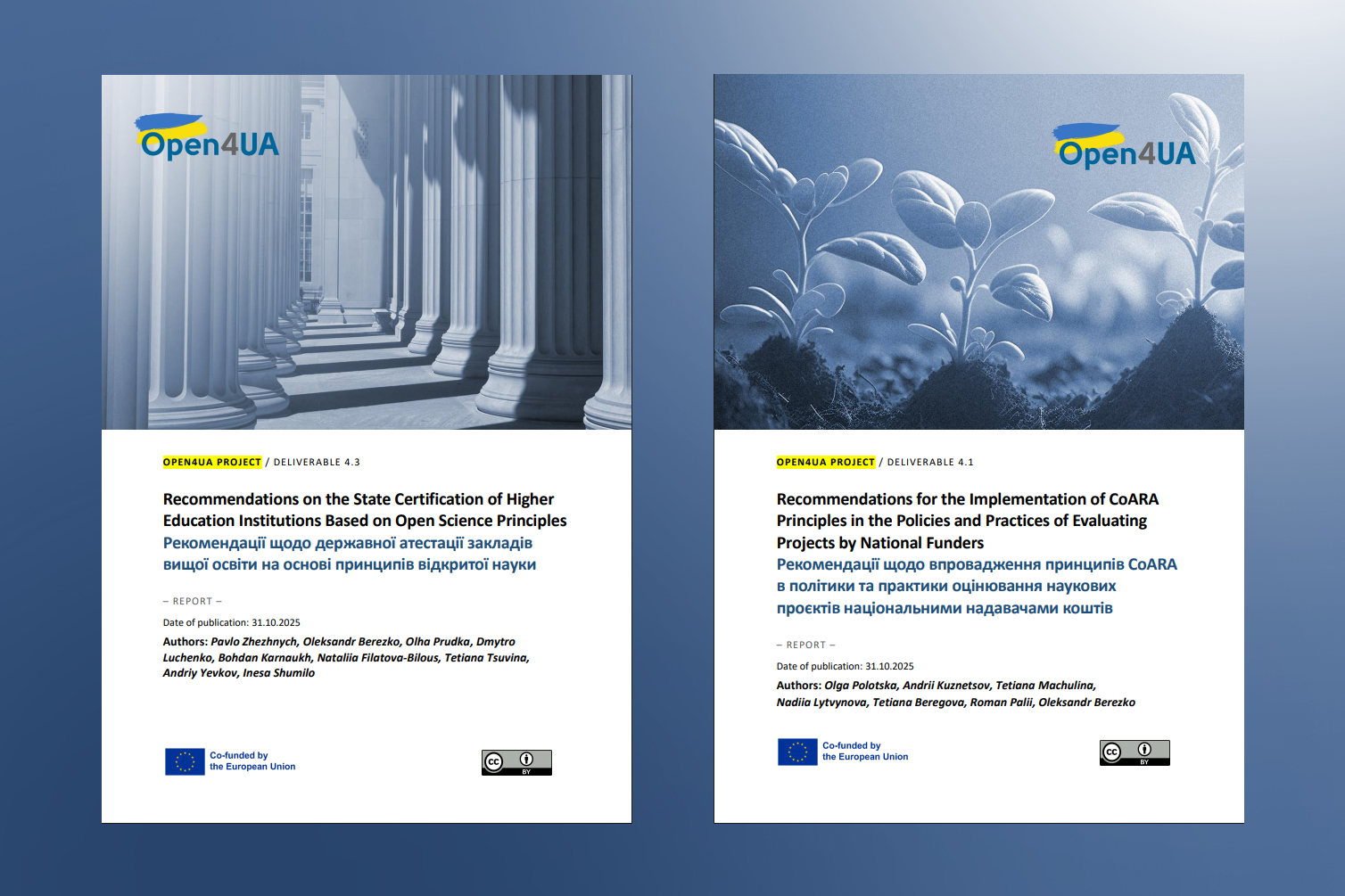The Open4UA project has successfully reached milestone No. 4, confirming the readiness of national instruments for implementing open science priorities. In particular, the project has developed important recommendations that ensure the further development of open science at the national level.
D4.1. Recommendations for implementing CoARA principles in the policies and practices of scientific project evaluation by national funding agencies
The Open4UA Deliverable D4.1 report contains strategic recommendations for implementing CoARA (Coalition for Advancing Research Assessment) principles in the policies and practices of research funding by national foundations in Ukraine. The document highlights the urgent need to reform traditional, quantitative-oriented research evaluation systems, which often do not fully reflect the quality and societal impact of scientific activity. The report emphasises the need to transition to qualitative, fair and transparent evaluation models based on expert review and responsible use of metrics in order to support open science, diversity and inclusiveness.
Ukraine's participation in the CoARA initiative is seen in the context of post-war recovery and integration into the European and Global Research Areas. The document highlights the growth in participation of Ukrainian institutions (16 by 2025) and the establishment of a CoARA National Centre in Ukraine as important achievements. At the same time, systemic barriers have been identified, including insufficient funding, limited English language proficiency, information isolation and the consequences of war. To overcome these barriers, the recommendations call for harmonisation of legislation, cultural transformation towards academic integrity and openness, and organisational strengthening through capacity building, increased transparency and expanded international cooperation.
Ultimately, the implementation of CoARA principles will contribute to improving the quality, credibility and competitiveness of Ukrainian research. This will create a more equitable and scientifically sound evaluation system, aligned with European standards, and strengthen Ukraine's position as a new powerful player in the global scientific community.
D.4.3. Recommendations for state accreditation of higher education institutions based on the principles of open science
Despite the challenges, Ukraine's scientific system is developing in line with global trends that require greater transparency, openness and social responsibility in higher education and research. The National Plan for the Development of Open Science, approved by the Cabinet of Ministers of Ukraine, is a key strategic framework that sets the direction for these transformations.
Task 5 (improving the research evaluation and quality assurance system) and, in particular, Task 5.1, which provides for the updating of the criteria for state accreditation of higher education institutions and scientific institutions, play a central role in the process. This includes developing recommendations based on DORA and OSCAM aimed at overcoming outdated evaluation systems that hinder the implementation of open science and the development of institutions in the post-war period.
The Open4UA project played a key role in promoting this national research evaluation reform, launched in November 2024 in accordance with the principles of Open Science (OS) and CoARA. Members of the Open4UA team played a leading role in the Ministerial Working Group, established by Ministry Order No. 1402 of 16 November 2023, to develop a new methodology for evaluating scientific institutions. Prepared in October–November 2024, this methodology is largely based on knowledge sharing within the Open4UA initiative.
In 2025–2026, more than 370 research institutions and 130 higher education institutions will be certified under the new evaluation framework. Based on the results, the government plans to strengthen the institutional capacity, financial mechanisms and support of leading scientific organisations.
Inspired by the example of the Research Excellence Framework (REF) in the United Kingdom, the new methodology introduces for the first time an expert assessment of institutional impact, including contributions to the development of science, national defence and socio-economic progress. Combining quantitative indicators with qualitative expertise, the framework integrates the principles of open science while remaining practical within the current legal framework. This is a significant step towards creating a transparent, reliable and inclusive evaluation system.
This report analyses the key elements of the reform and outlines directions for its further development to ensure that the research evaluation system in Ukraine is dynamic, fair and consistent with the principles of open science.
D4.2. The Open Database of Projects Funded by the National Research Foundation of Ukraine (NRFU)
The project team also developed and launched a test version of an open online database containing information about research projects funded by the National Research Foundation of Ukraine (this database is currently available on the test site https://coara.org.ua/).
The creation of an open database of projects funded by the National Research Foundation of Ukraine (NRFU) is a key milestone in promoting the principles of open science and transparent management of scientific research in Ukraine. This database serves as an institutional mechanism for collecting, structuring and disseminating information on research and development (R&D) projects funded from the state budget, providing open access to data on scientific activities, funding and results for researchers, policymakers and society at large.
In line with the European Open Science Agenda, the NRFU database contributes to the creation of a national research information infrastructure that supports collaboration, accountability and evidence-based decision-making. It ensures compatibility with European systems and forms the basis for data-driven research policy and evaluation.
In terms of concept and functionality, the NRFU Open Database is the Ukrainian equivalent of the European CORDIS (Community Research and Development Information Service) database, which provides open access to information on projects funded under EU framework programmes. Similar to CORDIS, the NRFU database ensures the visibility of funded projects, promotes the dissemination of scientific results and supports stakeholder engagement. At the same time, it is adapted to the Ukrainian scientific context, offering detailed indicators at the project level – both scientific and financial – in compliance with national legislation and digital governance standards.
Ultimately, the NRFU Open Database is an important step towards Ukraine's integration into the European Research Area (ERA) by creating open, transparent and compatible scientific data systems that strengthen trust, innovation and collaboration in the national and international scientific community.
